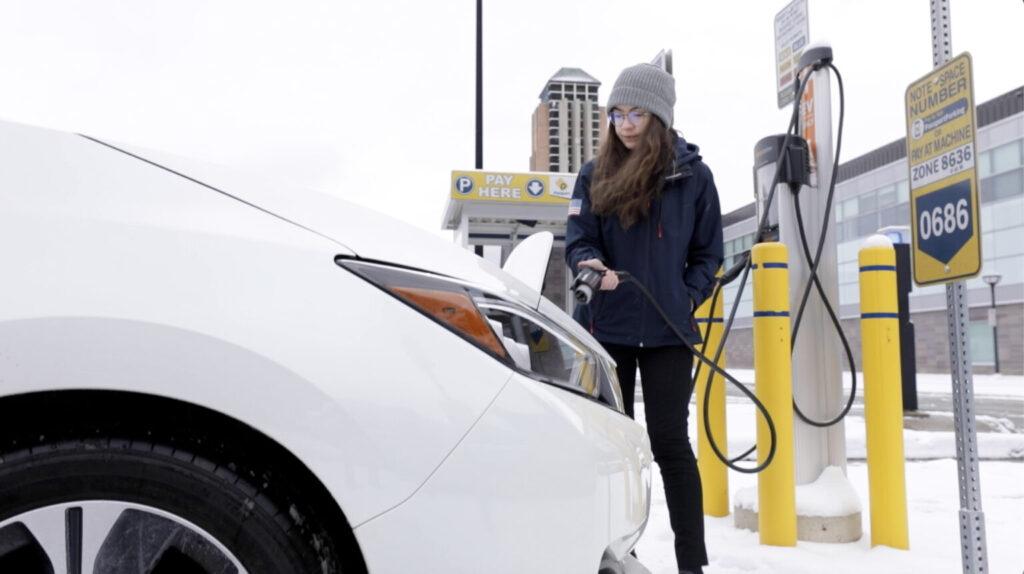
In an effort to cultivate a robust EV ecosystem in the place where the modern auto industry was born, the University of Michigan Electric Vehicle Center is launching with these three focus areas: accelerating collaborative R&D, developing a highly skilled workforce, and establishing advanced campus infrastructure and facilities to support both research and education.
U-M and the state have finalized the contract for the $130 million center. Michigan lawmakers approved funding for it last year in the FY 2023 budget
“This prudent investment from the state is going to be pivotal in ushering in a mobility future that is sustainable, safe, and equitable for Michigan workers, our communities, and the nation,” said Alec D. Gallimore, the Robert J. Vlasic Dean of Engineering, the Richard F. and Eleanor A. Towner Professor, an Arthur F. Thurnau Professor, and a professor of aerospace engineering.
“While the EV revolution is well underway, there’s an immense amount of work to do in order to meet—and then push beyond—the U.S. goal that half of new car sales be electric by 2030. We need to address areas like the workforce, cost, vehicle range, charging infrastructure and sustainability. Our center will build on more than a century of U-M leadership in transportation to tackle these and other critical areas.”
New director will establish industry advisory board
To lead the center, Gallimore has appointed Alan Taub, an engineering professor and former auto industry executive, as director. Taub previously served as vice president of global R&D at General Motors and held leadership roles at Ford Motor Co. and General Electric. At U-M, he is a professor of materials science and engineering and mechanical engineering. He has a track record of successfully launching public-private partnerships, including the $148 million Detroit-based Manufacturing USA Institute known as Lightweight Innovations for Tomorrow, or LIFT.
Among his first tasks as director, Taub will establish an industry advisory board and work with its members to identify needs and set the center’s initial workforce development strategies and R&D priorities.
“We’re undergoing a redefinition of personal mobility in a way we haven’t seen in a century,” said Taub, who also is the Robert H. Lurie Professor of Engineering. “It requires changes to the vehicles, the infrastructure, consumer behavior, policy and more. We need academia, industry and government to work together to enable a smooth transition.”
“Southeast Michigan drove the evolution of mobility from the horse and carriage to affordable automobiles100 years ago. We have what it takes to do it again, but the stakes are as tremendous as the opportunity.”
Michigan’s workforce is among those most vulnerable in the EV transition. In a preliminary U-M study on how various automotive job categories could be affected, researchers found that Michigan, Indiana and Ohio hold more than half of the jobs in the most at-risk category of auto parts manufacturing.
Of all the auto-related job types examined, auto parts manufacturing has the highest number of positions directly tied to internal combustion engine technology—and is susceptible to downsizing. In those three states, 22% of all auto parts manufacturing jobs are vulnerable.
At the same time, Michigan is expected to see some of the highest growth in battery manufacturing capabilities by 2030, according to a report by Argonne National Labs that looked at where automakers and joint ventures are planning battery projects.
Workforce is one of the center’s three focus areas, along with technology research and advanced campus facilities.
Workforce efforts will include battery engineering
With an estimated $20 million of the state investment, the center will target both current and future generations of mobility workers with educational offerings at U-M and other institutions across the state, aiming to eventually engage more than 1,200 students a year throughout its network.
At U-M, the center will identify where to expand undergraduate and master’s degree programs as well as continuing education courses and credentials to close industry gaps. It will also participate in efforts such as the EV Jobs Academy to support education at the pre-apprentice, apprentice and associate degree level. The center’s programs will utilize Michigan Engineering’s holistic people-first engineering approach.
An early focus will be on battery engineering and battery manufacturing, given the industry’s urgent needs and U-M’s existing expertise. Today U-M offers more than 20 undergraduate and master’s-level courses on battery materials, manufacturing and management, EV electrical components and grid power systems.
Collaborative R&D will launch with a technology roadmap
An estimated $50 million of the funding is dedicated to supporting research and development of innovative technology through public-private partnerships. The center will work with industry to identify priorities, develop a technology roadmap and implement a collaborative research model. And it will draw on and deepen U-M’s strengths in areas like mobility, batteries, materials, manufacturing, life cycle analysis and manufacturing, including: the DOE Energy Frontier Research Center on solid-state battery technology, Mcity, the U-M Transportation Research Institute, the Global CO2 Initiative and the School for Environment and Sustainability.
Advanced facilities like Battery Lab 2.0 can support R&D and education
The center contract sets aside $60 million for campus infrastructure. Subject to approval by the Board of Regents, that could include a teaching, training and development facility with an expanded, upgraded Battery Lab to support both hands-on education and research into next-generation technologies. The proposed facility would be located on North Campus with the College of Engineering. Plans for a facility would come before the Board of Regents for consideration.
Today Michigan Engineering hosts one of just a few university battery pilot lines in the nation, and it’s the only one in the heart of the auto industry. It currently supports academic and industry researchers from around the globe, and it’s consistently booked solid.
Taub also is a professor of macromolecular science and engineering and director of the Michigan Materials Research Institute, which houses the Battery Lab and the Center for Materials Characterization.











More Stories
What You Should Know Before Filing a Car Accident Claim
Injured in a Car Accident in St. Louis? Here’s What to Do Next
Historic Sportscar Racing (HSR) and Goodyear Announce Multi-Year Partnership